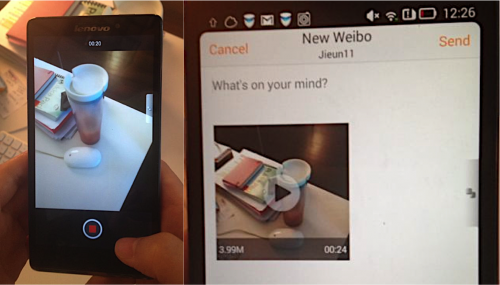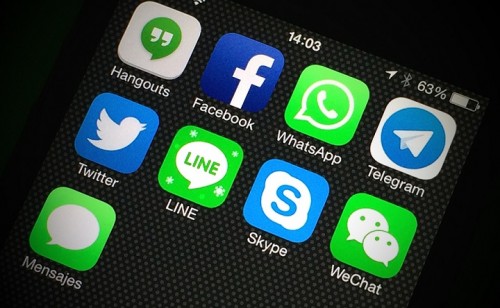We Are Social Asia Tuesday TuneUp #136
Weibo adds new feature for video records and uploads
Weibo app added a new feature that allows video recording, uploading and playing directly in Weibo. Although embedded videos have been there for a while, it’s meaningful that this is the first time Weibo ever built video function directly without involving third party sites. However, the new function doesn’t seem to be a threat to existing local video sharing apps like Tencent’s Weishi and Sina’s Miaopai at the moment as it doesn’t have video editing ability. But the new feature might add more burdens on Sina for the responsibility to censor inappropriate video content.
WhatsApp might no longer be free in India
Free messaging or call apps like WhatsApp and Skype might not be free anymore in India. The issue all comes down to the conflict between Telecom companies and OTT (over-the-top) service providers. (OTT refers to text, audio or video sent over the internet.) With rising smartphone usage and data access in India, increasingly fewer people are using SMS or phone calls, which are more profitable than data plans for Telecom companies. In order for revenue to bounce back, Telecom companies have requested the Telecom Regulatory of India (TRAI) to approve a so-called ‘connectivity charge’ for free messaging and calls. But it is not clear whether this ‘connectivity charge’ will be applied to consumers in addition to data usage. However, the Internet and Mobile Association of India argues that TRAI should not be involved in this matter. It remains to be seen how the issue will pan out.
All chat apps in China to verify users with real identities
In an effort to “clean up” all instant messaging services, the Chinese government has ruled that all public account owners on any chat apps in China have to register with their true identities and get permission to publish. Although some chat apps like Weixin already has started real-name verification processes last year, this is the first time that the government has issued a formal regulation on this matter.
Internet users are almost always online
Recent research reported by eMarketer has found that US internet users are almost always connected. A total of 60% of those surveyed claimed either to never disconnect, or to do so at most a few times a year. In contrast, 20% managed to disconnect altogether at least once daily.

Snapchat is growing its smartphone penetration
Snapchat is now the third largest social app among millenials by smartphone penetration, according to the comScore Mobile Metrix for June 2014. The app is present on 32.9% of smartphones owned by 18-34 year olds; only Facebook (75.6%) and Instagram (43.1%) are higher.

Facebook is removing like gates
Facebook is scrapping the ‘like gate’, the system by which developers can require users to ‘like’ a page in order to enter a competition or use an app. The network appears to be keen that when people ‘like’ a page, it’s because they actually like it. A Facebook blog post said:
To ensure quality connections and help businesses reach the people who matter to them, we want people to like Pages because they want to connect and hear from the business, not because of artificial incentives. We believe this update will benefit people and advertisers alike.
Twitter updates ad pricing model
Twitter has announced new tools for ‘objective-based campaigns’, including four new ways to buy ads on the network. Previously, the only option was ‘cost per action’ (RTs, replies, favourites), but the following are now all viable payment options: new followers, conversions to external websites, app installs or user email addresses.
Twitter launches ‘flock to unlock’
Twitter is testing a new feature called ‘flock to unlock’, in which a certain number of users must retweet a message in order to unlock a deal, or exclusive piece of content. The first brand to trial the system is Puma – the sportswear giant will be offering access to a set of TV ads two days before their full release.
Twitter tests showing tweets from accounts your friends follow
Twitter is reportedly showing some users tweets from accounts they don’t follow, but which are followed by those that they do. The below tweets by @aleefbaypay display what it looks like.
WTF @twitter, why am I seeing tweets from accounts that I don’t follow but are followed by someone whom I follow?
— aleefbaypay (@aleefbaypay) August 3, 2014
@EliLanger yup. The buzzfeed tweet is the one in question. pic.twitter.com/FTbHTXs2Z9
— aleefbaypay (@aleefbaypay) August 3, 2014
Twitter adds ‘payment and shipping’ option
Some Twitter users have noticed a new ‘payments and shipping’ option in the settings section of the Android app. It’s not currently functional, but has fuelled speculation about a native shopping service on the platform in future.
Pinterest updates messaging on the platform
Pinterest has released a new messaging feature, which allows users to further discussion about their favourite pins. Previously, users could share pins with one another, but the feature has been expanded to include proper conversation. The video below details how it works.
Foursquare launches its new app
Foursquare has launched the latest version of its app, minus the check-in. Since all its social features have been moved to Swarm, the main app is now intended as a rival to the likes of Yelp, and hopes to provide personalised recommendations. These will be based on a combination of location data and specific ‘tastes’, which users can enter into the app.
This is bound to have an impact for advertisers. Naturally, there are challenges with moving from two apps to one; Foursquare now requires people to download Swarm before it can continue obtaining their valuable check-in data. In theory, though, there are also huge potential benefits. With access to location and taste data, Foursquare could become a destination for highly targeted marketing – it’s certainly something to keep an eye on.
Sprint sends the Frobinsons on holiday
Telecom company, Sprint, has been using a fictional family, named the Frobinsons, to promote its friends and family plan. It is now extending the campaign on social, by sending them on a road trip, in a brand tie-in with Roadtrippers. Content will be released from @Sprint, @TomFrobinson and @Roadtrippers on Twitter, as well as on Facebook.
Our home for the next 6 weeks. Let the summer #FramilyTrip begin! Follow our adventures here: http://t.co/AIuhkbK1ZO pic.twitter.com/ZTzAmB4t84
— Tom Frobinson (@TomFrobinson) August 4, 2014
Levi’s incorporates social elements in new microsite
Levi’s has launched a new ‘Live in Levi’s’ microsite, on which it is featuring several films telling the stories of young creatives and their jeans. At the heart of the site is a shoppable video, while users can also submit their own content across social networks using #LiveinLevis.

McDonald’s gets backlash from Instagram ads
McDonald’s has been running a series of ads on Instagram in the last few weeks. However, user feedback hasn’t always been great – in fact, there’s a significant amount of negative feedback on each post. This may be the case as Instagram users get used to ads on the network, but it’s a worthwhile warning to brands using ads on social media.



